
You are reading:

You are reading:
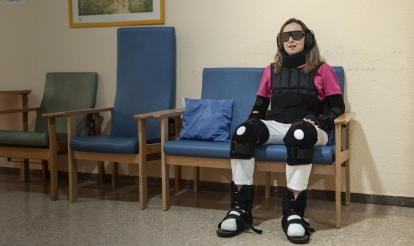
16.07.24
7 minutes readA pioneering study – based on the use of a suit that limits mobility and reduces the wearer’s strength, coordination, dexterity and sensory perception – simulates how ageing affects the daily lives of older people. The initiative, selected in the call for experimental research projects in social sciences by the Social Observatory of the ”la Caixa” Foundation, helps enhance the empathy of social and healthcare professionals in residential care homes so that they can provide more humane and closer quality care.
“How many years do you want me to add today?” jokes Gema Postigo García, a physiotherapist at the Reina Sofía care home for older adults in Las Rozas (Madrid), with Luz and Teresa, two of the women who live at the centre. She is one of the professionals who participated in this innovative project, which aims to enhance the empathy of social and healthcare staff by using a suit that simulates the effects of ageing on those who wear it. The study, initially conceived by Stefan Walter, has been developed by Rosa María Martínez Piédrola and other researchers from Rey Juan Carlos University (URJC), along with Fernando Martínez Cuervo from the Department of Social Rights and Welfare of the Principality of Asturias.
The research was selected in the 2019 call for experimental research projects in social sciences by the Social Observatory of the ”la Caixa” Foundation. This is the first time that a project of this nature, measuring the importance of empathy in care, has been carried out in our country. “Until now,” reflects Martínez Piédrola, “it has been very important for professionals to have technical training, which is fundamental, but when it comes to caring for older adults, empathy makes it possible to provide a much more humane and closer level of care.”
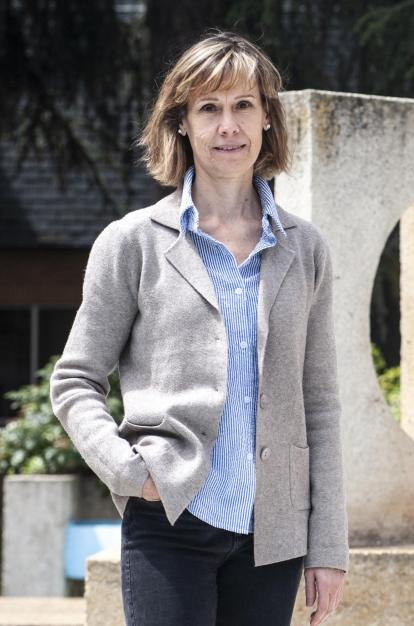
The suit, which had already been successfully used in the training of health science professionals, is made up of several components and weighs around 20 kg distributed across different parts of the body. The person wearing it experiences reduced mobility, dexterity and sensory perception. “The effect produced by the weight is a reduction in speed and mobility, and it also has an impact on the person’s cardiorespiratory capacity,” says the researcher. The suit is complemented by glasses that simulate various visual pathologies, such as cataracts or glaucoma, and headphones that reduce hearing.
One of the effects of wearing the suit is sensory alterations. Changes in vision and hearing limit the cognitive, social and functional capacity of the wearer. Although the passage of time does not affect everyone in the same way, “from the moment we are born we are ageing,” Martínez Piédrola reminds us. “Our whole body, its structures and cells, develop progressively, and from a certain age this ageing begins to affect cardiorespiratory capacity, the locomotor system and the sensory organs, among other things.”
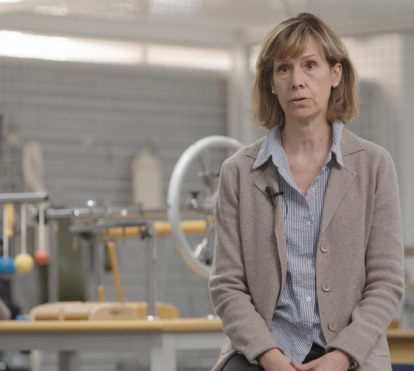
In part, these limitations were experienced first-hand by the social and healthcare professionals who participated in the project. “It was very strange because, while doing the activities with it, the professionals themselves began to realise why the people they work with on a daily basis take so long to get dressed, why they need things to be repeated to them so many times or why they get tired. The suit is very effective for understanding the situation of older people much better,” says the expert.
Postigo García confirms this: “The experience is very good. You’re more aware and you discover all the difficulties the residents have in moving because of their various conditions. What surprised me most was not only the joint limitations you can have with the suit, but also the reduction in respiratory capacity.”
Under the title Mejorar la empatía hacia el mayor mediante la simulación de la vejez [Improving empathy towards older adults by simulating old age], this research was carried out in four residential care homes for older adults – two in the Community of Madrid and two in the Principality of Asturias – with direct care professionals, such as assistants, physiotherapists, nurses and occupational therapists. “All the people who took part received prior training on the importance of empathy, and then half of them tried on the suit and carried out various everyday activities with it, such as climbing stairs, using the lift, lying in bed and trying to get up or picking something up from the floor,” explains Martínez Piédrola.
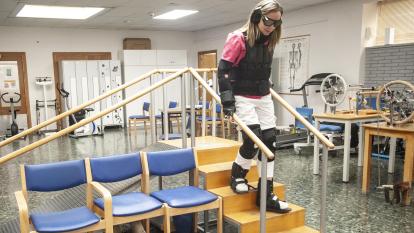
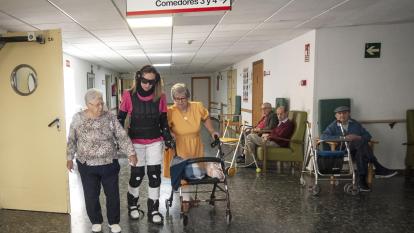
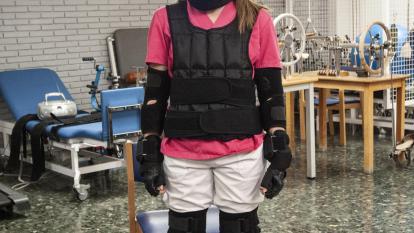
The relevance of this study lies in its potential to enhance quality of life. Through empathy, we develop skills such as understanding, respect and active listening. According to some previous studies, empathy is in fact a factor that significantly influences care and human interaction, which has an impact on the satisfaction of older adults, improves their clinical data and enhances their physical, social and emotional well-being. “One of the benefits it produces is much more personalised care because the carer puts themselves in the shoes of the older person and understands their limitations and problems much better,” she says.
But that’s not all. Increased empathy also has a positive impact on the professionals themselves, reducing levels of anxiety, depression and hostility. “By putting themselves in the person’s situation, the relationship between them improves significantly. It has been observed that in many cases, stress levels decrease and the quality of life of the carers themselves improves.”
In the specific case of Postigo García, for example, her view of her work has changed. “As a physiotherapist, I was already aware of the limitations that older adults have in terms of joint mobility and lung capacity, but now I understand them much better. Before I put the suit on, I didn’t realise all the difficulties. Although I still have to push them, I’ve learned to be much more patient with them.”
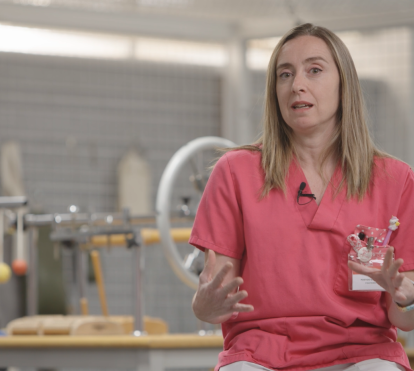
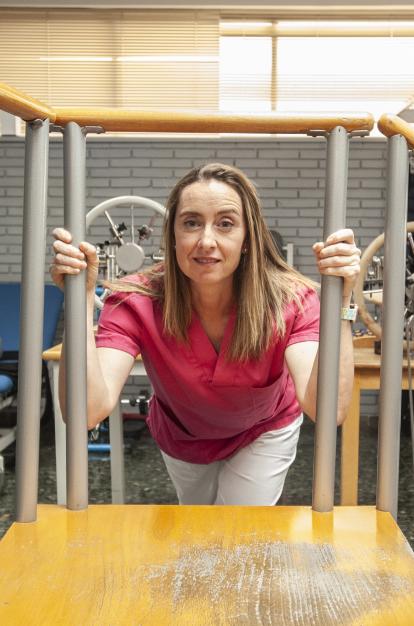
The results of the study, which also involved researchers from the Rey Juan Carlos University (URJC), Marta Pérez de Heredia Torres, Sergio Serrada Tejeda and Rebeca Montes Montes, shed some light on the matter. “The main conclusion was that the professionals who used the suit increased their empathy in general terms and, more specifically, its cognitive component and personal perception,” says Martínez Piédrola.
Translated into numbers, according to the Jefferson Medical Empathy Scale in its version for healthcare professionals, those who took part the trial improved their overall empathy by 14.5%, increased their cognitive empathy skills, which consider the older adult’s perspective, by 5%, and enhanced aspects related to their ability to identify the emotions of the older adult by up to 15%.
“We anticipated that empathy would increase, but we’ve seen quite significant levels,” says the expert, who also highlights a point “that goes beyond the technical aspects: the satisfaction of the professionals themselves to have had this experience.” A satisfaction that has also reached the people receiving the care. “The residents tell me they’ve noticed that I’m a little more patient with them,” says the physiotherapist, “and that I demand a little less of them when it comes to doing exercises.”
From now on, the possibilities of this successful experiment are manifold. “The idea would be to expand the sample and take the study to more residential care homes throughout Spain. In the meantime, we’ll continue to use it in the training of future healthcare professionals. These two avenues would be very interesting,” reflects Martínez Piédrola before helping Postigo García to rejuvenate by taking off her suit “year by year, piece by piece” and putting it back in its case.